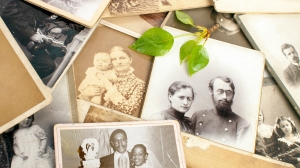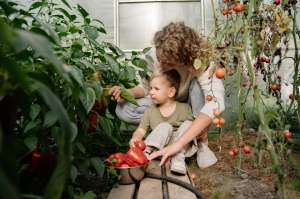The visits of grandchildren to their grandparents are a moment of happiness and help to fight against isolation. But visiting an elderly loved one with Alzheimer's disease with children can feel tricky. How to explain the changing behavior of grandpa and grandma? How to explain Alzheimer's disease to children? Keep reading to find out.
With Alzheimer's disease and related disorders like temper tantrums, behavior changes can become confusing to loved ones. It is difficult, in this context, to imagine holidays or Sundays with grandparents in the same way. To avoid the embarrassment of the little ones or the discomfort of the older ones in the face of the disease, many families end up avoiding the question by spacing out the meetings with the sick grandparent, once the diagnosis has been made, showed a French survey on the communication between the Alzheimer's patient and his grandchildren.
However, with or without Alzheimer's, the older generations have a lot to offer the younger ones and vice versa. Recently, an American researcher even demonstrated that spending time with grandchildren generally improves the cognitive health of grandparents. Therefore, continuing to spoil the little ones by including them in regular meetings with Grandma is possible and beneficial by keeping in mind certain points.
Elderly people with Alzheimer's: maintaining family ties
How to deal with someone with Alzheimer's? The diagnosis of Alzheimer's must not prevent seeing grandchildren; it would be a terrible double penalty. Family life, seeing loved ones, is good for the quality of life of a person with Alzheimer's and for their health, too, thanks to the pleasure and emotions that this provides. And emotions are particularly important for a person with Alzheimer's disease who sees his cognitive abilities disappear but whose "emotional brain" remains intact. In addition, it reinforces self-esteem; remain a grandparent with a family role.
How do you explain Alzheimer's disease to a child?
Alzheimer's disease progressively alters the memory and behavior of the older person. These changes can frighten or confuse children when they visit their grandparents. Of course, stopping going to see grandpa and grandma is not the ideal solution. It is not recommended to deprive grandchildren of their loved ones with Alzheimer's disease.
Being honest with children and explaining the disease to them based on what they can understand at their age can instead allege their fears. It is certainly not easy to explain to a child that grandpa has Alzheimer's disease. Pathologies that affect the brain can be confusing; however, even in the early stages of Alzheimer's disease, children quickly notice even subtle changes. If grandpa or grandma forgets their name or repeats themselves more often than usual, they have questions.
You have to choose your words according to the age of the child. You can use images and metaphors that will help to understand a little better or tell him, for example, that something is going on in grandpa's brain; that's why he sometimes acts in an unexpected way. In any case, the disease can be explained with simple words.
You can also say that it is a disease that cannot be seen, but that the person affected by this disease has difficulties in their daily life and that they need to be helped. It is required to insist on the fact that this disease plays on forgetting; a small child can very well understand that memory loss is one of the symptoms of Alzheimer's. The child must also understand that it is not a disease that generates pain and does not hurt physically.
It is then considered that from the age of seven, the child can understand a more detailed explanation of the disease, its phases, and its consequences. Therefore, it is important, from this age, to go into more detail and to explain to the child why his grandparent says things that are a bit strange because a child who understands a situation is a child better able not to be disturbed by it.
And in case of aggression, what precautions to take?
During the visits, it will be a question of testing their reactions over short periods of time because the person gets tired quickly. When verbal exchanges are impossible, there remains more tactile contact, taking the hand of the elderly person and caressing it. But again, it will depend on the child; some will refuse, in which case it is not relevant to force them; otherwise, the grandparent will also resist.
It should be emphasized that anxiety attacks or apathetic periods (loss of interest in usual activities) are part of the disease and are not personally directed against them. This is important because some children may feel a form of guilt.
Many experiences of transgenerational exchanges in retirement homes and nurseries have shown fabulous effects of the presence of children on the elderly. This calms them, softens them, and above all, enhances them.
Benefit from visiting a loved one with Alzheimer's
Older people with Alzheimer's disease can also benefit from visits from loved ones, especially their grandchildren. For their part, the children will appreciate these souvenirs. But, it is essential to prepare the children for the visit, both at home and in nursing homes.
Here are some tips to make your visit to your loved one with Alzheimer's disease go as smoothly as possible.
Talk to the children before the visit
Tell them about any changes they might notice in grandpa and grandma since the last visit. Simply explain to them the main symptoms of Alzheimer's disease. Reassure them by explaining that these phenomena are linked to the disease and have nothing to do with them.
Set the duration of the visit
Young children and the elderly with Alzheimer's disease tire quickly. The little ones often make a lot of noise. However, your elderly loved one needs calm to remain serene.
Prepare activities to do with the grandparents
Plan to listen to music, play simple and enjoyable games for all, tell stories or prepare a journal/family album together. There is no shortage of activities to do with someone with Alzheimer's disease, and they can even stimulate their memory.
Give the kids some simple responsibilities
Kids also like to help their grandparents. For example, ask them to bring a glass of water to grandpa or grandma, to read him the newspaper, or to prepare him a sandwich. These "helper" tasks allow children to feel involved without requiring too much effort.
Let them choose
If the children feel uncomfortable or frightened during the visit, they may prefer to sit on the lap of one of the parents rather than do a direct activity with grandpa or grandma. Let them find their comfort zone.
Don't leave the kids alone with your Alzheimer's loved one
Unless you are sure, they can handle the emotional challenge of meeting their grandparents with Alzheimer's disease, always accompany your children on the visit.
Do not space out the visits too much
Alzheimer's disease evolves over time. If you allow too long a period between visits, children may see too great a change in the behavior and health of their loved ones. As long as your loved one is not at too advanced a stage of Alzheimer's disease, it is recommended to visit them quite often (but not every day to avoid creating an expectation that can be difficult for the person to live with).
Talk to children after the visit
Ask the children if they have any questions after visiting their loved one with Alzheimer's disease. Help them understand why grandpa or grandma behaved in a way that may have surprised them.
Well prepared, a visit to a loved one with Alzheimer's disease can be rewarding for the children and for your loved one.






